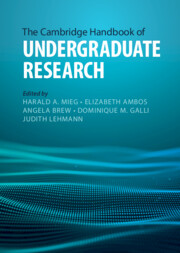Book contents
- The Cambridge Handbook of Undergraduate Research
- The Cambridge Handbook of Undergraduate Research
- Copyright page
- Contents
- Figures
- Tables
- Contributors
- Foreword
- Foreword
- 1 Introduction
- Part I Theory and Research on Undergraduate Research
- Part II Implementation, Approaches, Methods
- Part III Disciplines
- Part IV International Perspective
- Part V Avenues for Developing Undergraduate Research
- Index
- References
Foreword
Published online by Cambridge University Press: 11 August 2022
- The Cambridge Handbook of Undergraduate Research
- The Cambridge Handbook of Undergraduate Research
- Copyright page
- Contents
- Figures
- Tables
- Contributors
- Foreword
- Foreword
- 1 Introduction
- Part I Theory and Research on Undergraduate Research
- Part II Implementation, Approaches, Methods
- Part III Disciplines
- Part IV International Perspective
- Part V Avenues for Developing Undergraduate Research
- Index
- References
Summary
Over the last fifty years undergraduate research (UR) has transformed from a focus on selected students predominantly engaged in STEM (science, technology, engineering, and mathematics) disciplines at private US universities to one that challenges and transforms undergraduate curricula internationally for all, or many, students. The language used to describe UR varies between institutions, and includes terms such as ‘research-based education’ (Humboldt, Germany), ‘student as producer’ (Lincoln, UK), ‘problem-based and inquiry-based learning’ (McMaster, Canada), and ‘student as scholar’ (Miami, USA).
Information
- Type
- Chapter
- Information
- The Cambridge Handbook of Undergraduate Research , pp. xx - xxviPublisher: Cambridge University PressPrint publication year: 2022
